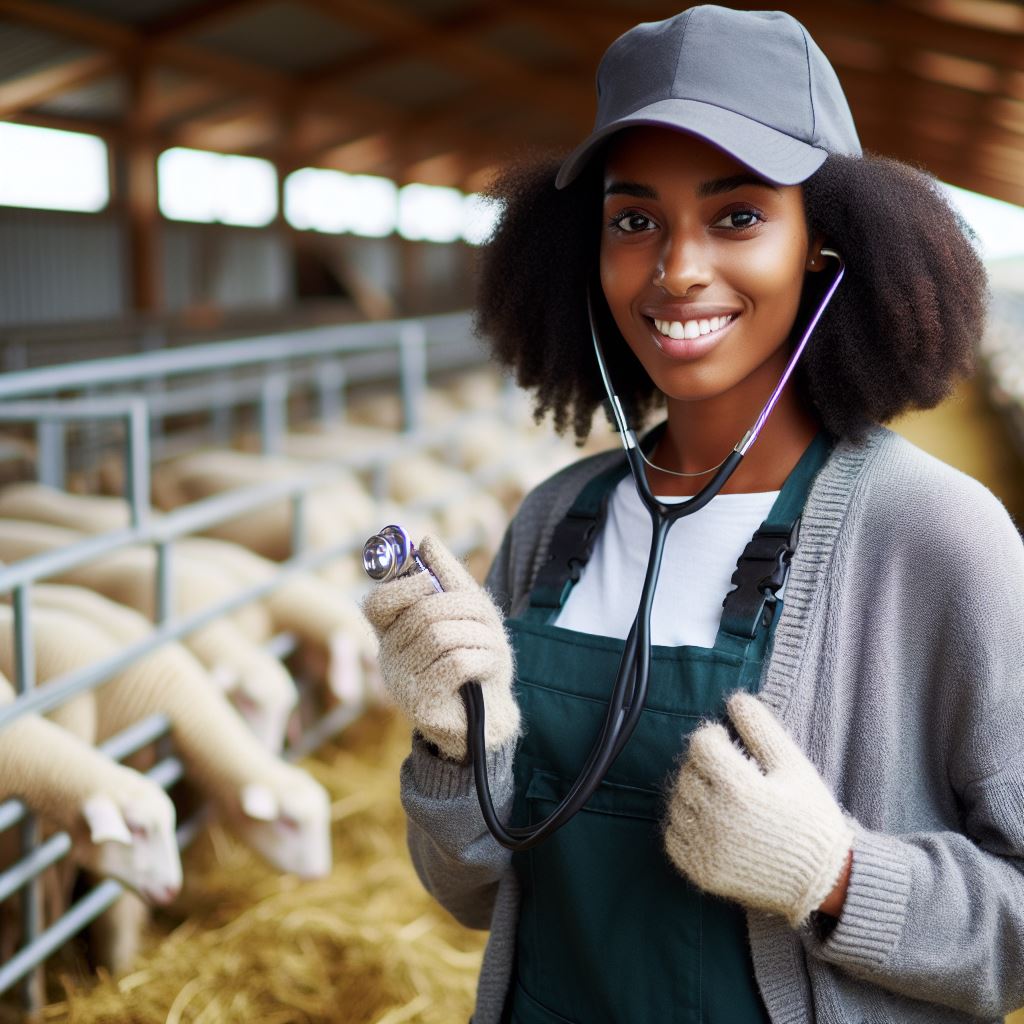Introduction
In the field of Nigerian animal nutrition, internships and real-world experience play a crucial role.
Gaining practical knowledge is essential to excel in this field.
In this blog post, we will explore the significance of internships, highlight the benefits of real-world experience, and discuss the opportunities available in the Nigerian animal nutrition industry.
Let’s delve into the dynamic world of internships and real-world experience in Nigerian animal nutrition.
The significance of internships in Nigerian animal nutrition
Value of practical learning opportunities in the field of animal nutrition
Internships are valuable in the field of animal nutrition as they provide practical learning opportunities.
By participating in internships, students gain real-world experience that cannot be obtained in a classroom setting alone.
Benefits of internships in gaining real-world experience
Internships offer specific benefits such as hands-on training, exposure to industry professionals, and networking opportunities.
Through internships, students can apply their academic knowledge to real-life situations, enhancing their understanding of animal nutrition.
Internships also allow students to develop essential skills such as problem-solving, critical thinking, and teamwork.
Interns have the chance to work with animals directly, conducting research, doing fieldwork, and observing their behavior.
These experiences contribute to a comprehensive understanding of animal nutrition and its practical applications.
Internships provide a bridge between academic learning and professional practice, preparing students for their future careers.
Interns learn about various aspects of animal nutrition, including feed formulation, dietary analysis, and food safety regulations.
By participating in internships, students can gain exposure to different sectors of the animal nutrition industry, such as livestock production or pet food manufacturing.
Internships often involve working alongside experienced professionals, allowing interns to learn from their expertise and guidance.
Interns can also build a professional network by establishing connections with industry leaders and potential employers.
Internships provide opportunities for students to engage in cutting-edge research projects and contribute to advancements in the field.
How internships can supplement academic knowledge
Through internships, students can develop a deeper understanding of the challenges and opportunities within the animal nutrition industry.
Internships often include practical tasks such as conducting experiments, analyzing data, and evaluating feed quality.
These activities help interns develop critical skills that are necessary for a successful career in animal nutrition.
Internships expose students to industry trends and innovations in animal nutrition, keeping them updated with the latest developments.
Internships also give students a chance to assess their suitability for a career in animal nutrition and explore their interests in the field.
Participating in internships can enhance students’ resumes and increase their chances of securing employment after graduation.
Employers value candidates with practical experience, and internships provide the opportunity to demonstrate relevant skills.
Internships often lead to job offers, as companies recognize the value of investing in interns who have already proven their abilities.
In essence, internships are of great significance in Nigerian animal nutrition as they provide practical learning opportunities and real-world experience.
Internships offer specific benefits, supplement academic knowledge, and prepare students for future careers in the field.
Read: How Nigerian Universities are Advancing Animal Production Research
Available Internships in Nigerian Animal Nutrition
Are you passionate about animals and interested in gaining practical knowledge in the field of animal nutrition?
Nigerian internships provide valuable opportunities to gain real-world experience and contribute to the advancement of the field.
In this blog section, we will explore available internships, eligibility criteria, application processes, and notable programs contributing to animal nutrition in Nigeria.
- Explore different organizations, institutions, and companies offering internships in animal nutrition.
- Gain hands-on experience working with professionals in the industry.
- Understand the practical application of animal nutrition theories and research.
- Develop essential skills in assessing and formulating animal diets.
- Contribute to ongoing research and innovation in animal nutrition practices.
These internships provide a platform to enhance your theoretical knowledge and apply it to real-world scenarios.
By immersing yourself in the field, you can observe the challenges and opportunities in Nigerian animal nutrition firsthand.
Eligibility Criteria and Application Process
- Check the eligibility criteria for each internship program to ensure you meet the requirements.
- Prepare your resume and cover letter highlighting relevant coursework, skills, and experiences.
- Submit your application through the specified channels, which may include online portals or email.
- Keep track of application deadlines and submit your materials well in advance.
- Prepare for possible interviews or assessments to demonstrate your passion and potential in the field.
It is crucial to pay close attention to the application process and submit all necessary documents accurately and on time.
Be sure to showcase your enthusiasm and dedication to animal nutrition, as it will increase your chances of being accepted into an internship program.
Notable Internship Programs in Nigerian Animal Nutrition
- The Animal Nutrition Research Institute (ANRI) internship program: Offers hands-on experience in state-of-the-art research facilities and cutting-edge projects.
- Government-funded internship programs: Aim to bridge the gap between academia and industry, providing opportunities for practical training and research.
- Industry-specific internship programs: Various companies and organizations in the animal nutrition sector offer internships to develop a skilled workforce and foster innovation.
- Non-profit organizations and NGOs: These organizations provide internships focusing on sustainable animal nutrition practices and create awareness about animal welfare.
These notable internship programs contribute significantly to the field of animal nutrition in Nigeria.
They serve as incubators for talent and innovation, helping shape the future of animal agriculture and welfare in the country.
Internships in Nigerian animal nutrition present an invaluable opportunity to gain practical experience and contribute to the field’s development.
Explore different organizations and programs, understand their eligibility criteria, and follow the application process diligently.
By participating in these internships, you can contribute to cutting-edge research, enhance your skills, and make a positive impact on animal nutrition practices in Nigeria.
Transform Your Career with Expert Guidance
Get personalized mentorship consulting that’s tailored to your unique path. Our expert advice is actionable and exclusive.
Get StartedRead: Financial Aspects: Pursuing Animal Nutrition in Nigerian Varsities

Gaining real-world experience in Nigerian animal nutrition
Various activities and responsibilities interns may have in the field
Internships in the field of Nigerian animal nutrition provide invaluable opportunities for students to gain practical knowledge and skills.
These internships involve a range of activities and responsibilities that contribute to a well-rounded learning experience.
- Field Visits: Interns may have the chance to visit farms and livestock facilities to observe animals and their feeding practices.
This exposure allows them to understand the impact of nutrition on animal health and productivity. - Feeding Trials: Interns may participate in feeding trials, where they assist in formulating diets and monitoring animal responses.
They learn how to design and execute trials to evaluate the effects of different diets on animal performance. - Data Collection: Interns play a crucial role in data collection during feeding trials. They learn to measure feed intake, analyze fecal samples, and record animal growth parameters.
These skills are essential for accurate data interpretation and research findings. - Data Analysis: Interns acquire hands-on experience in analyzing collected data using statistical software. They learn to identify trends, interpret results, and draw meaningful conclusions.
This practical understanding strengthens their research capabilities.
Exposure to the practical aspects of animal nutrition
1. Feed Formulation
Interns get exposure to the formulation of balanced diets for different animal species.
They learn to consider nutrient requirements, cost-effectiveness, and availability of feed ingredients.
2. Herd Management
Interns may assist in managing animal herds, including routine health checks, vaccination programs, and reproductive management.
This practical experience helps them understand the importance of nutrition in overall herd health.
3. Collaboration
Interns often work alongside experienced nutritionists, veterinarians, and researchers.
This collaboration allows them to learn from professionals in the field, gain insights, and develop networking opportunities.
4. Research Projects
Interns may be involved in ongoing research projects related to animal nutrition. They contribute to literature review, experimental design, and data analysis.
These experiences enhance their research skills and foster critical thinking abilities.
5. Laboratory Techniques
Interns learn various laboratory techniques applied in animal nutrition research, such as proximate analysis, nutrient profiling, and enzyme activity assays.
These technical skills are essential for accurate assessment of feed quality and formulation.
6. Industry Exposure
Interns gain exposure to the practical aspects of animal nutrition within the industry.
They may visit feed manufacturing companies, consultancies, or research institutions.
This exposure provides them with insights into the application of nutrition knowledge in real-world settings.
7. Communication Skills
Interns have opportunities to present their findings or assist in writing research reports.
These experiences improve their communication skills, enabling them to effectively disseminate their research findings to diverse audiences.
8. Professional Development
Internships provide a platform for interns to develop professionalism, time management, and teamwork skills.
They learn to balance work responsibilities, meet deadlines, and collaborate effectively in a professional environment.
Overall, internships in Nigerian animal nutrition offer a range of immersive experiences that contribute to the development of knowledgeable and skilled professionals.
These hands-on opportunities enable students to apply theoretical knowledge in practical settings, prepare them for future careers, and contribute to advancements in the field of animal nutrition in Nigeria.
Read: The Impact of Nigeria’s Climate on Animal Science Education
Challenges and Opportunities in Internships in Nigerian Animal Nutrition
In the field of animal nutrition, internships offer valuable real-world experience for aspiring professionals in Nigeria.
However, these internships do come with their fair share of challenges and obstacles.
It is important for interns to overcome these difficulties through innovative solutions to make the most of their opportunities and pave the way for career advancement.
Potential Obstacles and Difficulties Faced by Interns in Nigerian Animal Nutrition
- Limited access to resources and technologies, hindering practical learning.
- Inadequate mentorship and supervision, preventing proper skill development.
- High competition for internships, making it difficult to secure a placement.
- Language barriers in communicating with colleagues and supervisors.
- Insufficient financial remuneration, leading to financial burdens for interns.
- Inconsistent guidance and unclear expectations from internship providers.
It is crucial for interns not to be disheartened by these challenges and instead focus on finding innovative solutions.
Importance of Overcoming Challenges and Finding Innovative Solutions
Overcoming challenges during internships in animal nutrition is essential for personal and professional growth.
It not only demonstrates resilience and adaptability but also enhances problem-solving skills.
When faced with obstacles, interns should actively seek innovative solutions, such as:
- Building networks with industry professionals to gain access to resources and technologies.
- Seeking additional mentorship outside the internship program for guidance and skill development.
- Developing multi-lingual skills to effectively communicate with colleagues from diverse backgrounds.
- Exploring part-time opportunities to supplement finances during the internship period.
- Proactively seeking clarification and feedback from supervisors to understand expectations.
By embracing these innovative solutions, interns can overcome challenges and turn them into valuable learning experiences.
Opportunities for Growth and Career Advancement
Internships in animal nutrition provide numerous opportunities for growth and career advancement in the Nigerian context. Some of these opportunities include:
- Hands-on experience in formulating and evaluating animal diets.
- Opportunities to conduct research and contribute to scientific knowledge.
- Exposure to the latest advancements and technologies in the field.
- Networking with professionals and potential employers for future job prospects.
- Developing critical thinking and problem-solving skills through practical challenges.
These internships serve as a stepping stone towards a successful career in animal nutrition, enabling interns to gain valuable insights and make connections within the industry.
In review, while internships in Nigerian animal nutrition pose certain challenges, it is crucial for interns to view them as opportunities for growth.
Overcoming these challenges through innovative solutions not only helps interns develop essential skills but also opens doors to career advancement.
By embracing the possibilities presented by internships, aspiring professionals in animal nutrition can pave the way for a successful and fulfilling career.
Read: Modern Techniques & Trends in Nigerian Animal Nutrition Courses
The impact of internships in Nigerian animal nutrition
1. Highlighting success stories
- Mary, a recent graduate, secured an internship in a leading animal nutrition company in Nigeria.
- During her internship, Mary gained hands-on experience in formulating animal feed and conducting research.
- The exposure to real-world challenges and industry practices greatly enhanced Mary’s skills and knowledge.
- With the knowledge gained from her internship, Mary developed innovative animal nutrition solutions.
- Mary’s success story is just one example of how internships can positively impact individuals in the field.
2. Contributing to growth and improvement
- Internships have played a vital role in the growth and improvement of animal nutrition practices in Nigeria.
- Through internships, individuals have the opportunity to apply theoretical knowledge in practical settings.
- Interns work alongside experts and gain insight into the latest advancements and technologies in the field.
- This exposure enables interns to identify areas for improvement and implement innovative solutions.
- Internships also foster collaboration and knowledge exchange among interns, leading to collective growth.
3. Promoting sustainable agriculture and food security
- Internships in animal nutrition contribute to promoting sustainable agriculture and food security in Nigeria.
- Through their work, interns learn about the importance of balanced animal nutrition for food production.
- They acquire knowledge on sustainable feeding practices that optimize resources and minimize waste.
- Interns also gain insights into the challenges faced by local farmers and ways to address them.
- With this knowledge, interns can contribute to the development of sustainable farming practices.
In a nutshell, internships have had a significant impact on Nigerian animal nutrition.
They provide individuals with valuable experiences, fostering their growth and success in the field.
Moreover, internships contribute to the continuous improvement and development of animal nutrition practices in Nigeria.
They also play a crucial role in promoting sustainable agriculture and food security by equipping interns with the necessary knowledge and skills to address pressing challenges.
The success stories of individuals who have benefited from internships underscore the importance of these opportunities in shaping the future of animal nutrition in Nigeria.
Conclusion
Internships and real-world experience play a crucial role in Nigerian animal nutrition.
These opportunities offer valuable practical knowledge and skills that cannot be obtained solely through theoretical education.
By participating in internships, students and professionals can gain industry-specific expertise and develop a strong network of contacts.
They can also apply their classroom knowledge to real-life situations, enhancing their problem-solving and critical thinking abilities.
Moreover, internships provide a platform for individuals to showcase their capabilities and secure future job opportunities in the field of animal nutrition.
Employers often give preference to candidates with hands-on experience, as it demonstrates their dedication and commitment to the industry.
To those considering internships, it is essential to recognize the immense benefits they offer in terms of professional development.
Internships provide an invaluable opportunity to learn from experts and understand the practicalities of the animal nutrition field.
They also foster personal growth and confidence by exposing individuals to a challenging work environment.
For those interested in pursuing internships in Nigerian animal nutrition, there are several resources and organizations that can assist.
The Nigerian Society of Animal Production (NSAP) and various universities offer internship programs in the field.
Additionally, contacting local animal nutrition companies or farms can provide information on potential internship opportunities.
Internships are a gateway to gaining real-world experience, developing essential skills, and setting oneself apart in the Nigerian animal nutrition industry.
By actively seeking internships, individuals can embark on a successful professional journey in this field.




